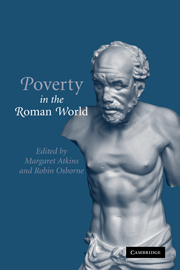Book contents
- Frontmatter
- Contents
- List of contributors
- Preface
- List of abbreviations
- Chapter 1 Introduction: Roman poverty in context
- Chapter 2 The poor in the city of Rome
- Chapter 3 Stratification, deprivation and quality of life
- Chapter 4 ‘You do him no service’: an exploration of pagan almsgiving
- Chapter 5 Writing poverty in Rome
- Chapter 6 Poverty and population in Roman Egypt
- Chapter 7 A pragmatic approach to poverty and riches: Ambrosiaster's quaestio 124
- Chapter 8 Portraying the poor: descriptions of poverty in Christian texts from the late Roman empire
- Chapter 9 Throwing parties for the poor: poverty and splendour in the late antique church
- Chapter 10 Salvian, the ideal Christian community and the fate of the poor in fifth-century Gaul
- Chapter 11 Poverty and Roman law
- Bibliography
- Index
Chapter 4 - ‘You do him no service’: an exploration of pagan almsgiving
Published online by Cambridge University Press: 22 September 2009
- Frontmatter
- Contents
- List of contributors
- Preface
- List of abbreviations
- Chapter 1 Introduction: Roman poverty in context
- Chapter 2 The poor in the city of Rome
- Chapter 3 Stratification, deprivation and quality of life
- Chapter 4 ‘You do him no service’: an exploration of pagan almsgiving
- Chapter 5 Writing poverty in Rome
- Chapter 6 Poverty and population in Roman Egypt
- Chapter 7 A pragmatic approach to poverty and riches: Ambrosiaster's quaestio 124
- Chapter 8 Portraying the poor: descriptions of poverty in Christian texts from the late Roman empire
- Chapter 9 Throwing parties for the poor: poverty and splendour in the late antique church
- Chapter 10 Salvian, the ideal Christian community and the fate of the poor in fifth-century Gaul
- Chapter 11 Poverty and Roman law
- Bibliography
- Index
Summary
Such organised material aid and services as the elite were prepared to extend to their social and economic inferiors were not directed at the poorest of Graeco-Roman society in the early imperial period. The marginal – women, slaves, foreigners, and to an extent children – were rarely included in munificentiae or euergesiae, and while the marginal are not co-extensive with the poorest, there is considerable intersection between the two groups, not least for this reason. In the Greek cities, euergetism occasionally was extended to slaves and foreign migrants, but of course when this did happen, they received by far the lowest proportions. The destitute were never en masse targets of aid. As Hendrik Bolkestein made clear long ago, Christian charity did not develop out of pagan munificence. The two were concerned with fundamentally different sectors of ancient society. This does not mean that no one ever gave to beggars before Christian charity swept the empire. On the contrary, it merely indicates that beneficentia was not aimed at beggars. To investigate almsgiving in the early empire, we need to get away from the discourse of euergetism and beneficentia.
This point is worth stressing, because the lack of organised relief directed at the destitute in this period has led historians to make rather extreme claims about pagan almsgiving. It has been suggested, for example, that it was standard in the pagan world to feel repulsed and depressed by the sight of diseased beggars, yet not be moved to assist.
- Type
- Chapter
- Information
- Poverty in the Roman World , pp. 60 - 82Publisher: Cambridge University PressPrint publication year: 2006
- 8
- Cited by



